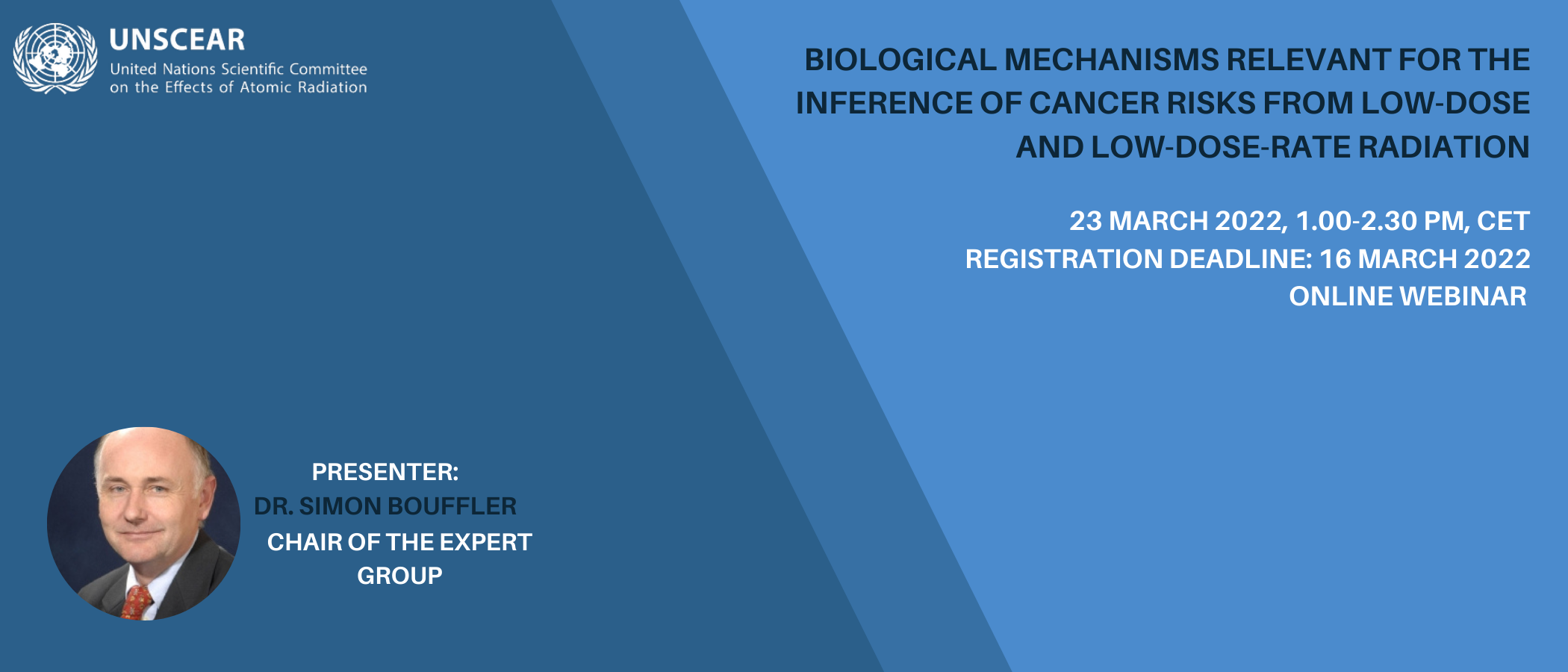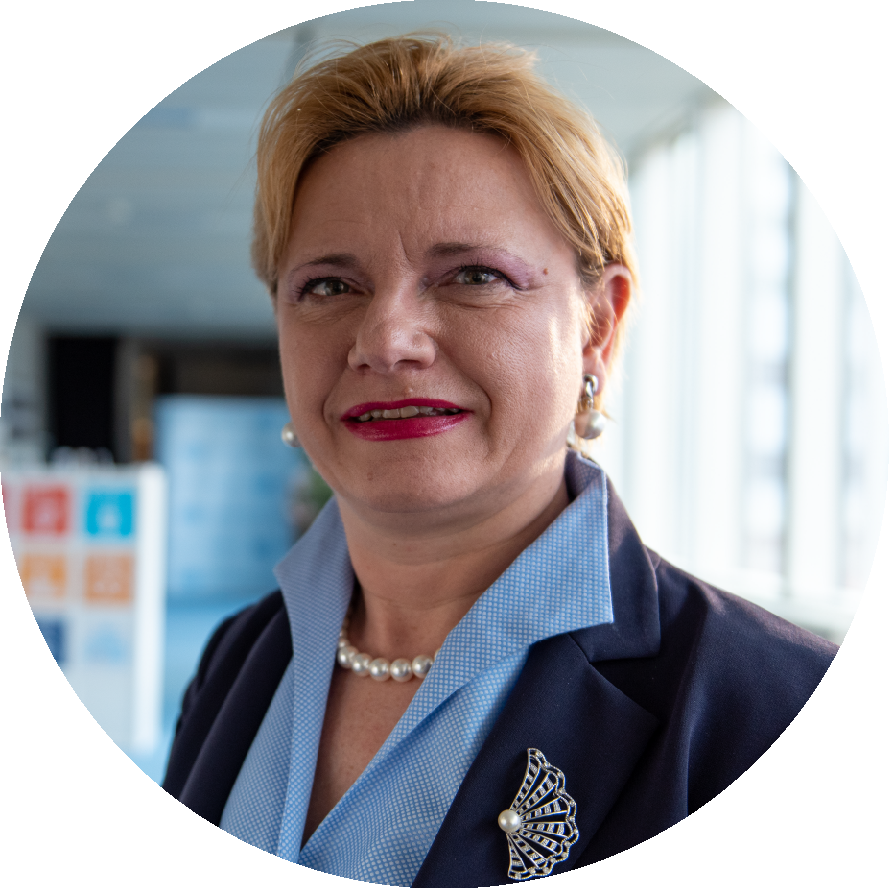
The aim of this event is to present the key findings of the latest Scientific Committee report published in December 2021 with focus on biological mechanisms that influence the cancer risks from low-dose radiation exposure since the evaluations since the 2012 White Paper1.
The online event is aimed at experts and decision makers from scientific, research, regulatory and diplomatic communities of the United Nations Member States and international organizations.
The United Nations Scientific Committee on the Effects of Atomic Radiation (UNSCEAR) was established by the United Nations General Assembly in 1955. The mandate of the Committee (with 31 Member States) is to independently assess and report on the levels and effects of exposure to ionizing radiation. Governments and organizations throughout the world use the Committee’s estimates as the scientific basis for evaluating radiation risk and for deciding on protective measures.
In 1973, the mandate expanded to include scientific estimates of radiation risk. In its UNSCEAR 2012 Report2, the Committee considered the attribution of health effects and the inference of risks from radiation exposure, as well as on the uncertainties in risk estimates. The understanding of the biological mechanisms by which radiation-induced effects such as cancer may occur is a relevant element for the inference of radiation risk. The 2020/2021 Report annex C “Biological Mechanisms Relevant for the Interference of Cancer Risks from Low Dose and Lose Dose Rate Radiation”3 aim was to synthesize the current knowledge on biological mechanisms of radiation actions at doses mostly in the low to moderate range relevant for cancer risk inference.

Ms. Borislava Batandjieva-Metcalf has been serving as Secretary of UNSCEAR since April 2019. She has over twenty-five years of experience in radiation and nuclear safety. She began her career as an inspector with the Bulgarian Nuclear Regulatory Authority and worked seven years with the International Atomic Energy Agency (IAEA) developing and supporting implementation of international safety standards on radioactive waste, decommissioning and contaminated site clean-up and remediation. After the IAEA, she worked as an independent consultant in radiation safety and licensing of radioactive waste management and new built projects before joining the European Commission as a Scientific Project Officer providing support on site radioactive waste, decommissioning and remediation safety projects in non-European Union countries. Ms. Batandjieva-Metcalf continued work as a Policy Officer at the European Commission over 7 years dealing with the European Union policy and EU law implementation in EU Member States. She represented the European Commission on the IAEA Waste Safety Standards Committee and was a Group Chair of 5th review meeting of the Joint Convention in 2015. She holds an MSc degree in nuclear and physical chemistry at the Comenius University in Bratislava and is a member of the Bulgarian Radiation Protection Society.

Dr. Simon Bouffler is interim Deputy Director for Radiation Protection Science and Head of Biological Effects Department at the UK Health Security Agency. Dr. Bouffler graduated from the University of Southampton with a BSc in biology in 1981. He completed a PhD in Southampton in 1984 on the modulation of chemical genotoxicity by cadmium. Between 1985 and 1990 he carried out research on DNA repair and mutagenesis at the University of Cambridge. He joined the National Radiological Protection Board (NRPB) in 1991, becoming Group Leader in 1994, Department Head in 2003 and interim Deputy Director in 2021. During this period NRPB became part of the Health Protection Agency (HPA, 2005-2013), then PHE (2013), and most recently, the UK Health Security Agency (2021).
Dr. Bouffler has been involved in several European and international research projects both as a participant and in lead roles. His main research interests are in mechanisms of radiation-associated diseases reflected in over 120 peer reviewed publications. He has been Secretary of the Advisory Group on Ionising Radiation from 2005 to present. He became a member Committee 1 (Radiation Effects) of the International Commission on Radiological Protection Committee in 2013 and a Main Commission member in 2017.
Dr. Bouffler has been representative of the United Kingdom to UNSCEAR since 2016 and a member of the UK delegation since 2006.

UK Health Security Agency, Interim Deputy Director, Radiation Protection Science, United Kingdom
Professor of Radiation Oncology, Northwestern University School of Medicine, Chicago, USA


Professor emeritus, LUMC, University of Leiden, The Netherlands. Visiting Professor, Department of Genetics, Nagoya University, Japan
Leader of Radiation Risk Group, Institute of Radiation Medicine, Helmholtz Munich, Germany


Associate Professor of Physiology and Assistant Dean of Safety and Research Facilities Management at Yong Loo Lin School of Medicine, National University of Singapore, Singapore
Laboratory of Chemistry and Biology of Metals, French Alternative Energies and Atomic Energy Commission Grenoble, France
